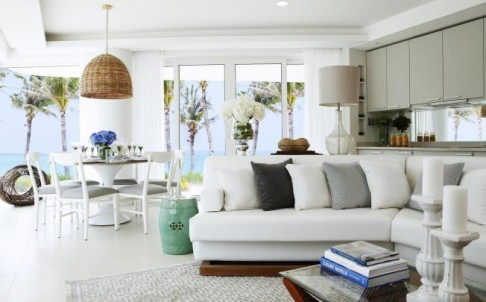Chinese investors eyeing Philippines
Low development costs and novel designs lure property seekers amid tight domestic market
Wednesday, 10 April, 2013
Jun Concepcion
Some innovative developments in the Philippines have panoramic views of the Pacific Ocean. Photo: Miguel Nacianceno
Disheartened by tight government controls in their domestic housing markets, investors from China, including Hong Kong, are looking overseas for alternatives.
Among their targets is the Philippines, which posted one of Asia's highest economic growth rates last year.
With development costs in the country much lower than on the mainland and in Hong Kong, the offshore investors are even being treated to rare and innovative choices.
For instance, a Hong Kong investor is now building a luxury 10,000 square foot, two-storey mansion on an elevated site in a 538,000 sq ft estate that will provide him with a panoramic view of the Pacific Ocean.
"Costs are high in Hong Kong and China so I've given up hope of setting up my dream retirement home in either location. I never imagined finding it recently in the Philippines on Guimaras Island," said Albert Wong Kam-hong.
Wong, who is chairman of Traffic Light Management Consultancy, which provides strategic advisory services to Hong Kong-listed firms, said his Philippine home would allow him to treat investors, clients and friends in Hong Kong and mainland China to a wonderful overseas holiday experience.
"Life has been good to me and being a Christian, I'd like to share some of my blessings with my fellow men, such as Hong Kong's Boy Scouts and other non-governmental organisations here," said Wong, who once served as deputy chairman of one of Hong Kong's largest real estate agencies.
Mainland and Hong Kong investors favour some of the most luxurious condominium projects in Manila's primary business district, Makati, specifically the Raffles Residences Makati and The Suites, said Julius Guevarra, associate director at Colliers International Philippines.
Another favourite is Raffles Residences, developed by Ayala Land, the property arm of one of the Philippines' largest conglomerates. The apartments occupy the 11th to the 30th floors of a complex that also houses the 278-room, five-star Fairmont Hotel and an exclusive 30-suite Raffles Hotel on the 9th and 10th floors.
"It is said that scores of Chinese investors have bought luxury units at Raffles Residences for as much as 40 million pesos (HK$7.5 million) each, which is at the very top end here compared to average prices of only about 7 million pesos," said Guevarra.
"Why are they buying here? Tight housing controls in China and Hong Kong are apparently driving scores of investors in both places to come to the Philippines, which provides stable investment yield growth amid a booming economy," he said.
The average rental yield of luxury condominiums in Manila is 6 to 8 per cent per year, while prices are on a steady uptrend of under 10 per cent a year due mainly to inflation, not speculation, he said.
"Demand by Chinese investors for luxury apartments is also being fuelled by senior executives of Chinese firms in the Philippines who need suitable accommodation," said Guevarra.
Last year, the Philippines posted gross domestic product (GDP) growth of 6.6 per cent, surpassing the government's target of 5 to 6 per cent growth and prompting a state planning agency to set this year's GDP growth target at 6-7 per cent.
With the economy on an uptrend, the country's stock market valuation has been posting record highs and is forecast to rise further. This has convinced some listed firms to consider raising fresh funds.
Melco Crown (Philippines) Resorts Corp, the Philippine unit of Macau gaming firm Melco Crown Entertainment, last week announced plans to raise up to US$400 million for a joint venture US$1 billion entertainment- casino complex in Manila.
Meanwhile, scores of investors from Hong Kong are eyeing apartments in Aqua Boracay by yoo, an upmarket resort project on the luxury central Philippine resort island of Boracay, widely seen as one of the world's best holiday destinations with its pristine-white beaches.
"More than half of the units in the first phase have been sold to Hong Kong investors. We are selling them for about US$3,500 per square metre for branded apartments that are completely furnished," said Marco Biggiogero, chairman of Aqua Boracay, which is guaranteeing a minimum 6 per cent annual return for the first two years.
Various fundamentals were driving the growing interest in the Philippine property market by investors from Hong Kong and China, said Biggiogero.
"Hong Kong has become a key transit point for international entry into the Philippines and investors are aware that the Philippines has Asia's highest economic growth rate after China.
"Prices in the Hong Kong market have risen dramatically in the past few years and investors are looking for opportunities in other markets where prices are yet to boom.
"The Philippines is currently priced significantly below Thailand and Indonesia so there is considerable scope for capital growth. This represents great value," he said.
While the Chinese are just at the initial stage of their penetration of the Philippine real estate market, they may also be looking at related investment opportunities.
"The Chinese are just beginning to seriously look at the Philippines and they perceive it as undervalued," said Biggiogero.
"They are not only looking to invest in property but also in the tourism sector to capitalise on the growing number of Chinese who travel abroad."

No comments:
Post a Comment